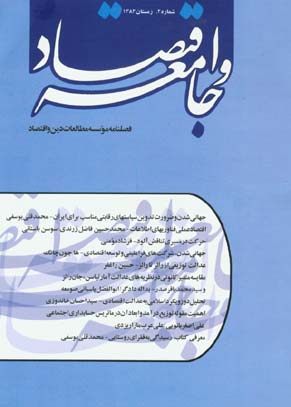فهرست مطالب

نشریه اقتصاد و جامعه
پیاپی 2 (زمستان 1383)
- 194 صفحه، بهای روی جلد: 12,000ريال
- تاریخ انتشار: 1384/01/28
- تعداد عناوین: 9
- فصل اول
-
صفحه 24
-
صفحه 52
- فصل دوم
-
صفحه 88
- فصل سوم
-
صفحه 150
-
Page 24Information technology has changed the shape and content of organization, trade and industrial institutions. It has made them more efficient, dynamic and effective. High productivity and sustained quality control can be possible only through sound and comprehensive information systems. However, in underdeveloped countries, most of the strategic executives and top decisionmakers do not have enough knowledge and understanding of information technology and only see it superficially. Optimum utilization of information technology requires careful cost-benefit analysis. In this paper we emphasize various economic aspects of information technology. We try to study the direct and indirect impact of information technology on productivity taking into consideration the related paradoxes. We also try to understand its impact on various trade institutions. Different kinds of investment and the various ways they correspond with the sub-structure of information technology are related to social conditions and organizational status. In the end we shall discuss the economies of systems based on internet websites and the negative impact of project failures of information technology and its subsequent economic impact and try to give appropriate suggestions.
-
Page 52Social phenomena are not generated spontaneously. To understand them exactly, we need to probe into history as the main source of research, which is also the case when we want to study the root causes of Iran's sustained underdevelopment despite having the conditions for development. In such a study it is necessary to go through various stages of Iran's historical development, from which the period of the Qajar dynasty is particularly important. Studying the historical events in this period helps us better understand the obstacles in the way of the country's development. In this paper an inter-disciplinary approach is followed to understand how the social subsystems interacted to create a cycle of underdevelopment in Iran. After a brief definition of culture and development, the role of the state in the national development of Iran during the Qajar period is discussed and then we try to investigate the output of thoughts and intellectual order of this period and analyze demand for and supply of cultural products. Later on we examine factors that inevitably led to autocracy and semi-colonial rule and conditions in the country, particularly the emphasis would be on brokerage mentality of people and their skepticism towards outside forces. A weak written cultural and its role in the continuation of underdevelopment is also underlined and finally we give some suggestions to break the vicious cycles of underdevelopment in this country.
-
Page 112The purpose of this article is to investigate the concept of canon variable in the justice theories of Amartya Sen, John Rawls and said Mohammad Baqer Sadr following an analytical and explanatory approach on the basis of a library study. After defining the canon variable we try to compare economic thoughts of the three philosophers in the sphere of justice.
-
Page 122The first step to know the difference of various Islamic approaches to justice is to understand them well so that a judgment could be possible and selection of the most efficient and comprehensive theory of economic justice could be made. This paper aims to introduce the two approaches of natural rights and moral group formation to economic justice which are reflected in the writings of the late Motahari and Hakimi respectively in the best manner. This paper explains the difference of the two approaches on the following aspects: explanation of social justice, measures of economic justice, moral norms and constraints of justice. Then we bring out the strength and weakness of each approach
-
Page 132The system of national accounts which is responsible for the organization of aggregate economic data, has been revised in response to the changes in the world economy together with social (poverty, unemployment and so on), and environmental problems. Recently the role of information economy is added to the necessity of such revisions. In spite of that, the existing revised systems do not have necessary and sufficient flexibility to capture the notion of growth and social justice. This is considered to be one of the main drawbacks of the existing aggregate and sectoral accounting systems. Any attempt to provide solutions is faced with the following three fundamental questions: A: In order to remove some of the main drawbacks of the existing accounting systems, which approach should be adopted? B: Is it possible to organize people's statistics like organized aggregate and sectoral economic statistics in much broader matrix framework than the existing accounting one? C: After organizing people's statistics with aggregate and sectoral statistics in a broader matrix framework, could it be used for comparable purposes? The main focus of this paper is to find answers to these three questions.
-
Page 150Globalization is a technical process, resulting from a revolution in telecommunication, information technology, and internationalization of production, distribution and consumption. In such a situation competition is inevitable. However, some economists regard globalization as the extension of imperialistic domination, while others consider it as the vanguard of peace, freedom and welfare, leading to development. The author of this paper is of the view that in reality, the question is not whether globalization is good or bad but whether the question is to what extent can a country use the opportunity provided by globalization to enhance the welfare of its population. This writer believes that competition can work well only if market mechanisms work properly. However, efficiency of market mechanisms depend on availability of symmetric information, transparent laws and order, absence of risks and uncertainty, cost reducing infrastructure on the one hand and effective domestic and international institutions on the other to provide a level playing ground for agents to compete freely on sound basis.


